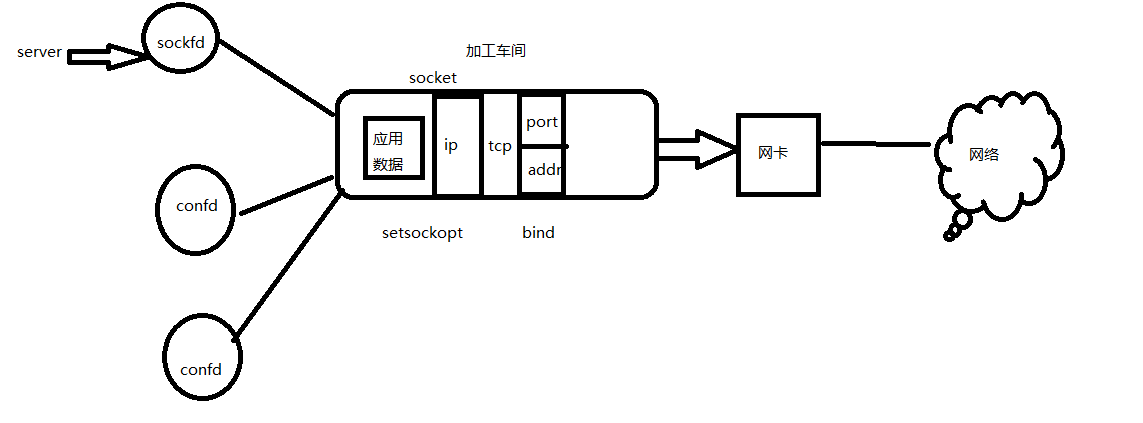再议socket

线程池
socket通道在内核中实际上只有一条,多个文件描述符指向同一个socket通道

本地套接字(类似于管道,两个进程的通信)

绑定是和磁盘文件绑定。
#include <stdlib.h>
#include <stdio.h>
#include <stddef.h>
#include <sys/socket.h>
#include <sys/un.h>
#include <sys/types.h>
#include <sys/stat.h>
#include <unistd.h>
#include <errno.h>
#include <string.h>
#define QLEN 10
/*
* Create a server endpoint of a connection.
* Returns fd if all OK, <0 on error.
*/
int serv_listen(const char *name)
{
int fd, len, err, rval;
struct sockaddr_un un;
/* create a UNIX domain stream socket */
if ((fd = socket(AF_UNIX, SOCK_STREAM, 0) < 0))
return(-1);
unlink(name); /* in case it already exists */
/* fill in socket address structure */
memset(&un, 0, sizeof(un));
un.sun_family = AF_UNIX;
strcpy(un.sun_path, name);
len = offsetof(struct sockaddr_un, sun_path) + strlen(name);
/* bind the name to the descriptor */
if (bind(fd, (struct sockaddr *)&un, len) < 0)
{
rval = -2;
goto errout;
}
if (listen(fd, QLEN) < 0)
{
rval = -3;
goto errout;
}
return(fd);
errout:
err = errno;
close(fd);
errno = err;
return(rval);
}
int serv_accept(int listenfd, uid_t *uidptr)
{
int clifd, len, err, rval;
struct sockaddr_un un;
struct stat statbuf;
len = sizeof(un);
if ((clifd = accept(listenfd, (struct sockaddr *)&un, &len)) < 0)
return(-1); /* often errno=EINTR, if signal caught */
/* obtain the client's uid from its calling address */
len -= offsetof(struct sockaddr_un, sun_path); /* len of pathname */
un.sun_path[len] = '�'; /* null terminate */
if (stat(un.sun_path, &statbuf) < 0)
{
rval = -2;
goto errout;
}
if (S_ISSOCK(statbuf.st_mode) == 0)
{
rval = -3; /* not a socket */
goto errout;
}
if (uidptr != NULL)
*uidptr = statbuf.st_uid; /* return uid of caller */
unlink(un.sun_path); /* we're done with pathname now */
return(clifd);
errout:
err = errno;
close(clifd);
errno = err;
return(rval);
}
int main(void)
{
int lfd, cfd, n, i;
uid_t cuid;
char buf[1024];
lfd = serv_listen("foo.socket");
if (lfd < 0)
{
switch (lfd)
{
case -3:perror("listen"); break;
case -2:perror("bind"); break;
case -1:perror("socket"); break;
}
exit(-1);
}
cfd = serv_accept(lfd, &cuid);
if (cfd < 0)
{
switch (cfd)
{
case -3:perror("not a socket"); break;
case -2:perror("a bad filename"); break;
case -1:perror("accept"); break;
}
exit(-1);
}
while (1)
{
r_again:
n = read(cfd, buf, 1024);
if (n == -1)
{
if (errno == EINTR)
goto r_again;
}
else if (n == 0)
{
printf("the other side has been closed.
");
break;
}
for (i = 0; i < n; i++)
buf[i] = toupper(buf[i]);
write(cfd, buf, n);
}
close(cfd);
close(lfd);
return 0;
}
//客户端
#include <stdio.h> #include <stdlib.h> #include <stddef.h> #include <sys/stat.h> #include <fcntl.h> #include <unistd.h> #include <sys/socket.h> #include <sys/un.h> #include <errno.h> #define CLI_PATH "/var/tmp/" /* +5 for pid = 14 chars */ /* * Create a client endpoint and connect to a server. * Returns fd if all OK, <0 on error. */ int cli_conn(const char *name) { int fd, len, err, rval; struct sockaddr_un un; /* create a UNIX domain stream socket */ if ((fd = socket(AF_UNIX, SOCK_STREAM, 0)) < 0) return(-1); /* fill socket address structure with our address */ memset(&un, 0, sizeof(un)); un.sun_family = AF_UNIX; sprintf(un.sun_path, "%s%05d", CLI_PATH, getpid()); len = offsetof(struct sockaddr_un, sun_path) + strlen(un.sun_path); unlink(un.sun_path); /* in case it already exists */ if (bind(fd, (struct sockaddr *)&un, len) < 0) { rval = -2; goto errout; } /* fill socket address structure with server's address */ memset(&un, 0, sizeof(un)); un.sun_family = AF_UNIX; strcpy(un.sun_path, name); len = offsetof(struct sockaddr_un, sun_path) + strlen(name); if (connect(fd, (struct sockaddr *)&un, len) < 0) { rval = -3; goto errout; } return(fd); errout: err = errno; close(fd); errno = err; return(rval); } int main(void) { int fd, n; char buf[1024]; fd = cli_conn("foo.socket"); if (fd < 0) { switch (fd) { case -3:perror("connect"); break; case -2:perror("bind"); break; case -1:perror("socket"); break; } exit(-1); } while (fgets(buf, sizeof(buf), stdin) != NULL) { write(fd, buf, strlen(buf)); n = read(fd, buf, sizeof(buf)); write(STDOUT_FILENO, buf, n); } close(fd); return 0; }
